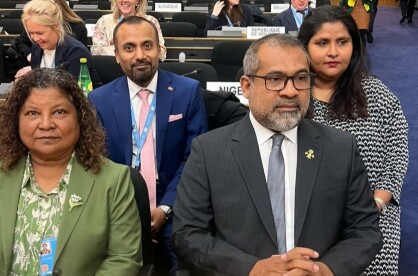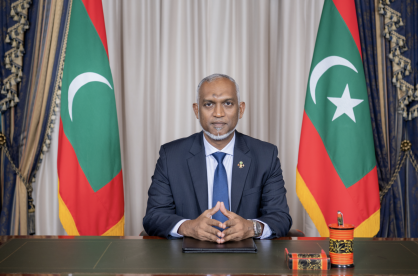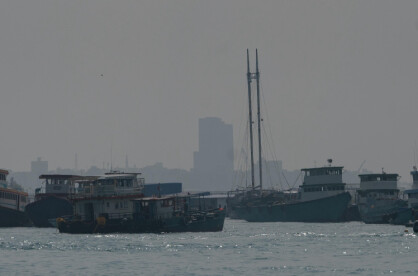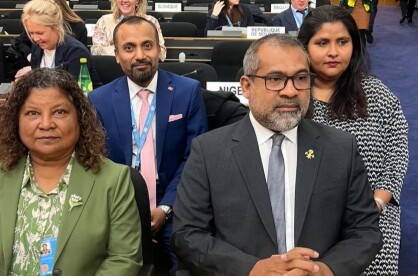Through the watchful eyes of the Human Rights Watch
Maldives has made strides in human rights advocacy, but much still need to be done.

Source - Ahmed Shurau — AFP via Getty Images
Maldives has made strides in human rights advocacy, but much still need to be done.

Source - Ahmed Shurau — AFP via Getty Images
In the auspicious month of July, the Maldives was removed from the list of “Human Rights Priority Countries” by the Foreign, Commonwealth and Development Office of the United Kingdom. This is cause for celebration, yet the dust swept under the rug is still festering.
The most ironic issue is the lack of accountability that is still such a glaring weakness of Maldivian governance. The irony stems from the Solih Administration’s paraded manifesto point, ‘zero-tolerance’, yet in practice, the intolerance borders on the lacklustre. The promised investigations by the newly minted government-appointed commission into the heinous crimes committed against disappeared and murdered reporter Ahmed Rilwan and murdered blogger Yameen Rasheed seems a moot point, with more questions than answers. This is obvious in the lack of charges brought against the suspected main culprit in the investigation, and also the amount of blatant stalling of other such cases by the commission.
Playing the retrospective card, the administration also championed the Ombudsperson’s Office for Transitional Justice, yet even this office gathers dust and distributes salaries.
The efforts against human trafficking was finally out in a positive light, with the upgrade to Tier 2 on the US State Department’s Trafficking in Persons Report in 2021. On top of this, a draft bill is also pending to bring the existing anti-human trafficking laws in compliance with UN protocols However, the usurping of the elites who profit from labour trafficking and exploitation is notably slow, for an administration vowing human rights advocacy.
To give context, more than one-third of the resident population in the Maldives comprises of foreign migrant workers, with at least 60,000 estimated to be undocumented. The construction and even the hospitality industry, two of the biggest cash-cows of the nation, thrives on these numbers to maximise profit at the expense of the unlucky few.
While being a campaigner on international stages as an environmental and climate change activist, the Maldives has not been able to fully restore the Environment Protection Agency as an independent entity. This is obvious with the amount of resort development projects that goes against recommendations, and even the infrastructure development that’s been planned and undertaken without much regard to sustainability or renewable energy resources.
It has been up to the citizens, according to Human Rights Watch, to take to the streets and civil courts to at least try and put a leash on development projects that were blatantly exploiting the environment. It is most disheartening to know that the defence of the fragile environment was once a huge driving point when the Solih Administration was in opposition, yet when the seats of power shifted, such ideologies have been disregarded. This is a human rights issue as the Maldivian people are immensely dependant on the fragile state of the environment for their survival, and even now extreme weather anomalies and destruction of islands have taken a toll.
Lockdown had spiked domestic violence cases to unheard of levels in the Maldives, yet the response has been almost dismissive. The worst of the situation manifests in the upper echelons of power, especially when thrice dishonoured politicians like Ali Waheed have still not been held accountable for their sexual harassment allegations.
The protests that took to the streets condemned this ‘tolerant’ attitude of the administration, yet more and more cases of harassment and exploitation by influential persons seem to keep coming to light. Defending the rights of women and girls to live safe and unhindered lives have not taken the stride that was promised to them, and the lack of movement on the Waheed case only cements this stance, or lack-thereof.
Given the religious stance of the nation, other global human rights standards are understandably not met, and even this was brought up in the report. The report condemns the extremist groups that perpetuate their ideologies with violent means and the nation does owe it to their citizens to defend their lives although they cannot be expected to support such non-islamic values.
On top of the labour exploitation and gender bias, most of the issues are rooted in elitism and nepotism, an administrative default position with a ruling party that had vehemently stood against the very things they now condone, albeit in action. Human rights has always been a touchy issue in the Maldives, with conflicting misogynistic cultural extremes and various religious interpretations. Additionally, certain allegations from within the human rights advocacy group, Human Rights Commission of Maldives, has also raised eyebrows and investigations,
However, the outlook seems positive. With more awareness, public stance has been moving towards a more universally updated position on the rights of individuals. As the world continues to watch with eagerness, hopefully the needful would be done with regard to uprooting the cancerous growths of elitists and hushed up investigations.



